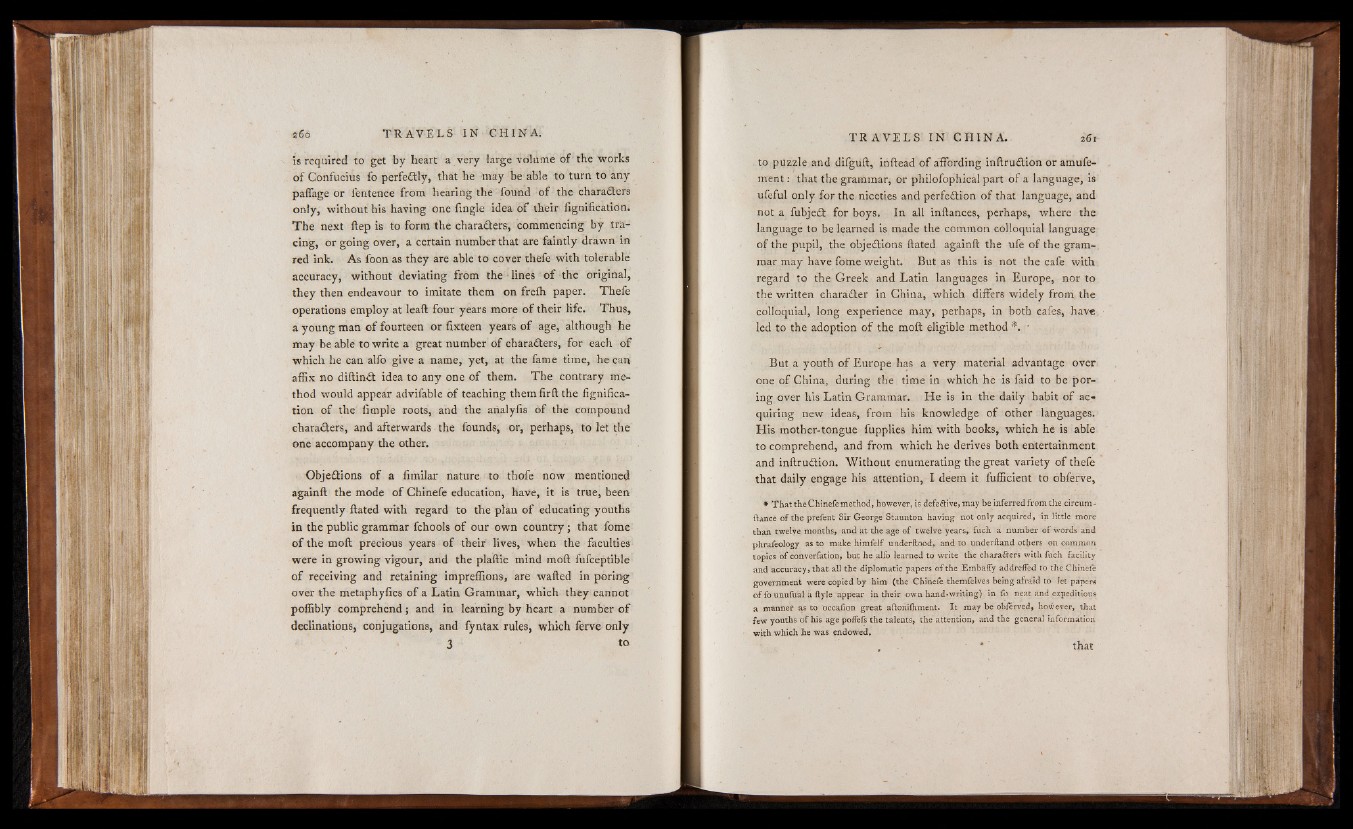
is required to get by heart a very large volume o f the "works
o f Confucius fo perfectly, that he may be able to turn to any
paffage or lentence from hearing the found o f the characters
only, without his having one fingle idea o f their fignification.
The next ftep is to form the characters, commencing by tracing,
or going over, a certain number that are faintly drawn in
red ink. As foon as they are able to cover thefe with tolerable
accuracy, without deviating from the Tines o f the original,
they then endeavour to imitate them on freih paper. Thefe
operations employ at lead four years more o f their life. Thus,
a young man o f fourteen or fixteen years o f age, although he
may be able to write a great number o f characters, for each o f
which he can alfo give a name, yet, at the fame time, he can
affix no diftinCt idea to any one o f them. The contrary method
would appear advifable o f teaching them firft the fignification
o f the fimple roots, and the analyfis o f the compound
characters, and afterwards the founds, or, perhaps, to let the
one accompany the other.
Objections o f a fimilar nature to thofe now mentioned
againft the mode o f Chinefe education, have, it is true, been
frequently dated with regard to the plan o f educating youths
in the public grammar fchools o f our own country; that fome
o f the mod precious years o f their lives, when the faculties
were in growing vigour, and the pladie mind mod fufceptible
o f receiving and retaining impreffions, are waded in poring
over the metaphyfics o f a Latin Grammar, which they cannot
poflibly comprehend; and in learning by heart a number o f
declinations, conjugations, and fyntax rules, which ferve only
3 ■ to
to puzzle and difgud, indead o f affording indruftion or amufe-
ment: that the grammar, or philofophical part o f a language, is
ufeful only for the niceties and perfection o f that language, and
not a fubjeCt for boys. In all indances, perhaps, where the
language to be learned is made the common colloquial language
o f the pupil, the objections dated againd the ufe o f the grammar
may have fome weight. But as this is not the cafe with
regard to the Greek and Latin languages in Europe, nor to
the written character in China, which differs widely from the
colloquial, long experience may, perhaps, in both cafes, have
led to the adoption o f the mod eligible method *. •
But a youth o f Europe has a very material advantage over
one o f China, during the time in which he is faid to be poring
over his Latin Grammar. He is in the daily habit o f acquiring
new ideas, from his knowledge o f other languages.
His mother-tongue fupplies him with books, which he is able
to comprehend, and from which he derives both entertainment
and indrudion. Without enumerating the great variety o f thefe
that daily engage his attention, I deem it fufficient to obferve,
* T h a t the Chinefe method, however, is defective, may be inferred from the circum-
ftance o f the prefent Sir George Staunton having not only acquired, in little more
than twelve months, and at the age o f twelve years, fuch a number o f words and
phrafeology as to make himfelf underftood, and to underftand others on common
topics o f converfation, but lie alfo learned to write the characters with fuch facility
and accuracy, that all the diplomatic papers o f the Embafly addrefled to the Chineie
government were copied b y him (the Chinefe themfelves being afraid to Jet papers
o f fo unuiual a ftyle appear in their own hand-writing) in fo neat and expeditious
a manner as to occaiion great aftoniihment. I t m ay be obierved, however, that
few youths o f his age poifefs the talents, the attention, and the general information
with which he was endowed,
* that